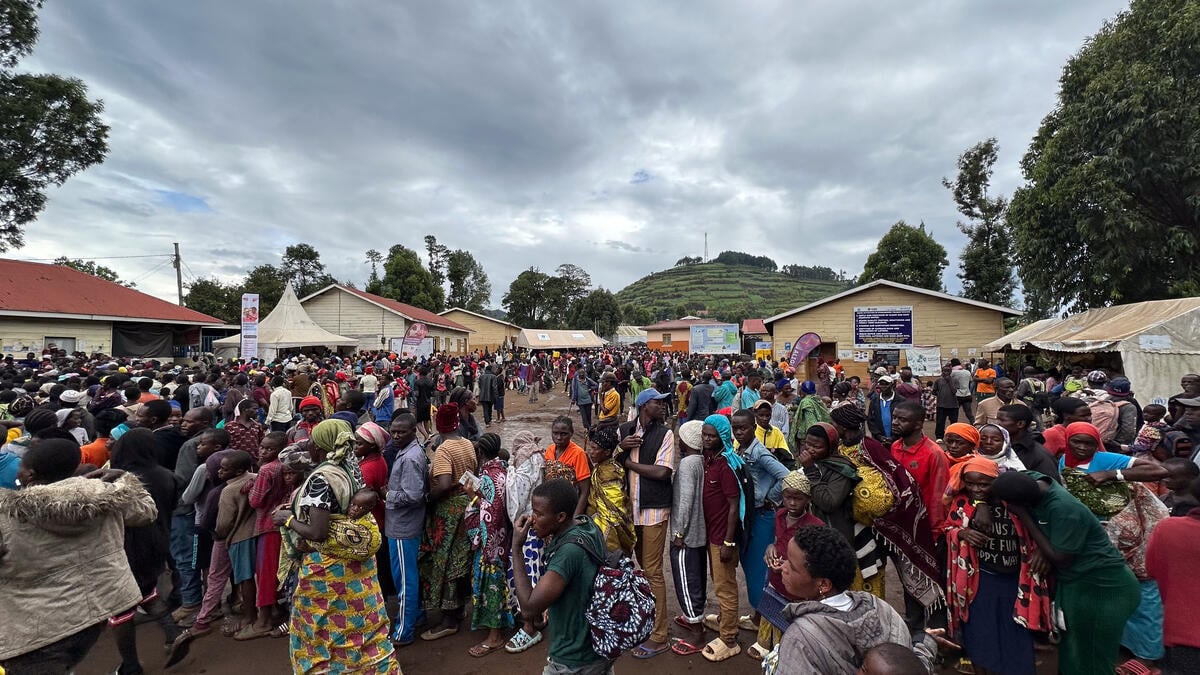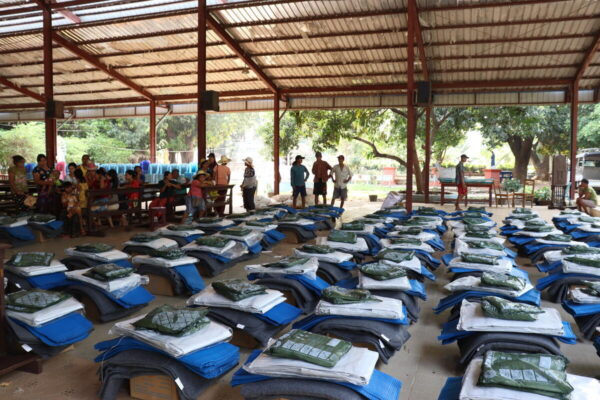
Recently arrived Congolese refugees at the Nyakabande Transit Centre in southwest Uganda, which is operating at six times its initial capacity. © UNHCR/Yonna Tukundane
This is a summary of what was said by UNHCR Representative in Uganda, Matthew Crentsil – to whom quoted text may be attributed – at today’s press briefing at the Palais des Nations in Geneva.
GENEVA – Uganda, Africa’s largest refugee host, is witnessing a sharp increase in the number of Congolese refugees crossing its western border due to increased insecurity in the eastern part of the Democratic Republic of the Congo (DRC). Amid ongoing funding cuts, this significant surge in refugee arrivals risks overwhelming the country’s capacity as it also responds to the needs of over 70,000 Sudanese refugees who have arrived fleeing the two-year-long war in Sudan.
Since January, over 41,000 Congolese have sought safety in Uganda, bringing the total number of Congolese in Uganda to nearly 600,000, out of the 1.8 million refugees currently hosted in the country. In the past two weeks, an average of 600 people have been crossing into Uganda daily.
Children are particularly affected, many arriving in a weakened state amid a high prevalence of malaria and malnutrition. Since January, up to nine children under five years reportedly died from malnutrition-related anaemia in Nyakabande and Matanda transit centres in the southwest, where new arrivals are being received.
New arrivals, mostly women and children, are entering Uganda through three main points: Bunagana in Kisoro district; Butogota in Kanungu; and Sebagoro in Kikuube. Arriving by foot or local transport, many are coming from the Rutshuru, Masisi and Goma areas in the DRC, having witnessed killings, sexual violence and other traumatic experiences during their flight. In Kikuube, nearly 4,000 refugees have crossed Lake Albert to reach Uganda in precarious conditions after travelling for hours in overcrowded boats in challenging weather conditions. There are also increasing reports of men traveling separately from their families to avoid being forcibly recruited by armed groups.
Transit and reception centres at the border are overflowing. Nyakabande, which has been hosting over 7,000 refugees, is now at six times its initial capacity. With the start of the rainy season, all available spaces, including kitchens and registration areas, are being used to accommodate refugees. While the authorities, UNHCR, the UN Refugee Agency, and partners are working to strengthen support to the newly arrived refugees, gaps in registration capacity and a lack of buses to support relocation efforts are also contributing to the congestion.
Critical shortages of water, latrines and bathing facilities, particularly at the Matanda and Nyakabande transit centres, are putting people at dire risk of deadly diseases. In Matanda, 150 latrines are needed to reach the minimum standard of 1 latrine per 20 people. Health services are also under increasing strain, struggling to cover the growing needs of many arriving in poor health.
Across the country, vital services for refugees have had to be deprioritized, including the closure of some health facilities and the reduction of some 250 health workers. All early childhood caregivers – a total of 332 – have been discontinued, along with reductions in teachers and school assistants. Shelter construction for people with specific needs has been halted, and a 30 per cent fuel cut for partner fleets is affecting logistics and service delivery.
Uganda’s Office of the Prime Minister (OPM), with support from UNHCR and partners, is registering new arrivals at border entry points, screening for health conditions including malnutrition, and providing medicine to prevent cholera. At the transit centres, people are given a space to sleep, hot meals and safe drinking water as well as relief items like blankets, sleeping mats, jerrycans and soap. Vulnerable individuals are identified for specialized support, including reunifying separated families. Relocations are ongoing, with approximately 3,000 people transferred every week from Nyakabande and Matanda to existing refugee settlements.
But the funding crunch is significantly impacting the response. UNHCR is scaling back on some standard protection activities, such as legal aid for refugees and safe spaces for children to gather and play, to prioritize the most critical needs. Border monitoring, registration of new arrivals, managing transit and reception centers, providing menstrual hygiene kits to women and girls as well as specific support to children and survivors of gender-based violence will remain a focus. Urgent funding is critical to maintain and expand these services.
For more information, please contact:
- In Kampala, Frank Walusimbi, walusimf@unhcr.org, +256 772 701140
- In Nairobi (regional) Faith Kasina, kasina@unhcr.org, +254 113 427 094
- In Geneva, Olga Sarrado, sarraddo@unhcr.org, +41797402307
Originally published by UNHCR on 8 April 2025





